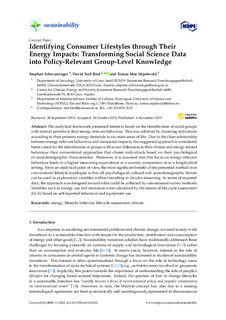Identifying Consumer Lifestyles through Their Energy Impacts: Transforming Social Science Data into Policy-Relevant Group-Level Knowledge
Journal article, Peer reviewed
Published version
Permanent lenke
http://hdl.handle.net/11250/2642449Utgivelsesdato
2019Metadata
Vis full innførselSamlinger
Originalversjon
10.3390/su11216162Sammendrag
The analytical framework presented herein is based on the identification of social groups with distinct patterns in their energy-relevant behaviour. This was achieved by clustering individuals according to their primary energy demands in six main areas of life. Due to the close relationship between energy-relevant behaviour and associated impacts, the suggested approach is considered better suited for the identification of groups with actual differences in their climate and energy-related behaviour than conventional approaches that cluster individuals based on their psychological or sociodemographic characteristics. Moreover, it is assumed that this focus on energy-relevant behaviour leads to a higher measuring equivalence in a country comparison or in a longitudinal setting. From an analytical point of view, the most significant benefit of the presented method over conventional lifestyle typologies is that all psychological, cultural and sociodemographic factors can be used as explanatory variables without resulting in circular reasoning. In terms of required data, the approach was designed around what could be collected by conventional survey methods. Variables such as energy use and emissions were calculated by the means of life cycle assessment (LCA) based on self-reported behaviour and equipment use.

